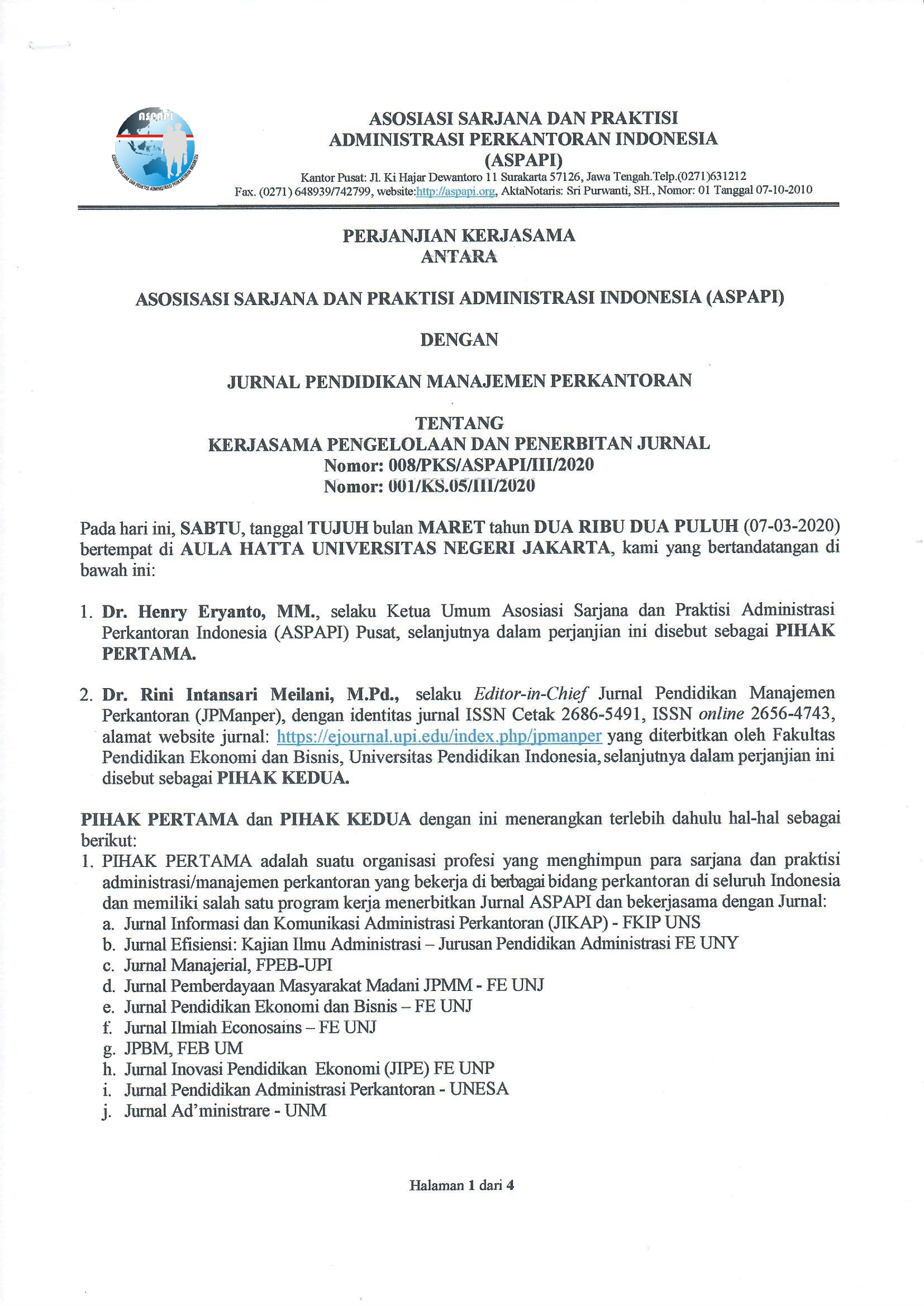Keterampilan Mengajar Guru dan Fasilitas Belajar Sebagai Determinan Terhadap Prestasi Belajar Siswa Kelas X Administrasi Perkantoran
Abstract
This study aims to determine how the influence of teacher teaching skills and learning facilities on the learning achievement of class X students in the office administration department, especially on archival subjects. The method used is the explanatory survey method (explanatory survey) with a quantitative approach. The instrument used was a questionnaire distributed to 44 students as respondents. The theory used in this research is Gagne's learning theory. The results showed that there was a positive and significant influence of the teaching skills of teachers and learning facilities on the learning achievement of Grade X students in the Office Administration Department.
ABSTRAK
Penelitian ini bertujuan untuk mengetahui bagaimana pengaruh keterampilan mengajar guru dan fasilitas belajar terhadap prestasi belajar siswa kelas X di jurusan administrasi perkantoran, kuhususnya pada mata pelajaran kearsipan. Metode yang digunakan adalah metode survey eksplanasi (eksplanatory survey) dengan pendekatan kuantitatif. Instrumen yang digunakan adalah angket yang disebarkan kepada 44 orang siswa sebagai responden. Teori yang digunakan dalam penelitian ini adalah teori belajar Gagne. Hasil penelitian menunjukkan bahawa adanya pengaruh positif dan signifikan dari keterampilan mengajar guru dan fasilitas belajar terhadap prestasi belajar siswa kelas X di jurusan Administrasi Perkantoran SMK swasta di Kota Bandung.
Keywords
Full Text:
PDFReferences
Adediwura, A. A., & Tayo, B. (2007). Perception of teachers’ knowledge, attitude and teaching skills as predictor of academic performance in Nigerian secondary schools. Educational Research and Reviews, 2(7), 165.
Bernard*, R. M., Brauer, A., Abrami, P. C., & Surkes, M. (2004). The development of a questionnaire for predicting online learning achievement. Distance Education, 25(1), 31–47.
Cizek, G. J. (1996). Learning, achievement, and assessment: Constructs at a crossroads. In Handbook of classroom assessment (pp. 1–32). Elsevier.
Djamarah, S. B. (2008). Psikologi pendidikan. Jakarta: Rineka Cipta.
Gibbs, G., & Coffey, M. (2004). The impact of training of university teachers on their teaching skills, their approach to teaching and the approach to learning of their students. Active Learning in Higher Education, 5(1), 87–100.
Gie, T. L. (2002). Cara belajar yang efisien. Jilid I Edisi Ke, 5.
Guyton, E., & Farokhi, E. (1987). Relationships among academic performance, basic skills, subject matter knowledge, and teaching skills of teacher education graduates. Journal of Teacher Education, 38(5), 37–42.
Hasibuan, M. S. P., & Hasibuan, H. M. S. P. (2016). Manajemen sumber daya manusia. Bumi Aksara.
Hung, C.-M., Hwang, G.-J., & Huang, I. (2012). A project-based digital storytelling approach for improving students’ learning motivation, problem-solving competence and learning achievement. Journal of Educational Technology & Society, 15(4), 368–379.
Inayah, R. (2013). Pengaruh kompetensi guru, motivasi belajar siswa, dan fasilitas belajar terhadap prestasi belajar mata pelajaran ekonomi pada siswa kelas XI IPS SMA Negeri 1 Lasem Jawa Tengah Tahun Pelajaran 2011/2012. S2 Pendidikan Ekonomi, 2(1).
Koswara, K., & Rasto, R. (2016). Kompetensi dan Kinerja Guru Berdasarkan Sertifikasi Profesi. Jurnal Pendidikan Manajemen Perkantoran (JPManper), 1(1), 61–71.
McBer, H. (2001). Research into teacher effectiveness. Early Professional Development Of Teachers, 68(216), 1–69.
Muhroji, M. (2006). IMPLEMENTASI PENGELOLAAN SEKOLAH BARBASIS KOMPETENSI.
Mulyasa, E. (2010). Penelitian Tindakan Kelas. Bandung: PT Remaja Rosdakarya.
Saphier, J., Gower, R. R., & Haley-Speca, M. A. (1997). The skillful teacher: Building your teaching skills. Research for Better Teaching Acton, MA.
Showers, B. (1985). Teachers coaching teachers. Educational Leadership, 42(7), 43–48.
Siedentop, D. (1976). Developing teaching skills in physical education.
Stronge, J. H., Ward, T. J., & Grant, L. W. (2011). What makes good teachers good? A cross-case analysis of the connection between teacher effectiveness and student achievement. Journal of Teacher Education, 62(4), 339–355.
Sudjana, N. (2009). Penilaian hasil belajar mengajar. Bandung: Remaja Rosdakarya.
Syah, M. (2003). Psikologi belajar. PT Rajagrafindo Persada.
Utomo, S. W. (2012). Pengaruh Prestasi Belajar Perencanaan Pengajaran Dan Micro Teaching Terhadap Praktik Pengalaman Lapangan Mahasiswa Pendidikan Akuntansi IKIP PGRI Madiun. Assets: Jurnal Akuntansi Dan Pendidikan, 1(1), 56–65.
Wragg, E. C. (1989). Classroom teaching skills: the research findings of the teacher education project. Psychology Press.
DOI: https://doi.org/10.17509/jpm.v5i1.25850
Refbacks
- There are currently no refbacks.
Copyright (c) 2020 Dysha Firmannisa, Nani Imaniyati
Jurnal Pendidikan Manajemen Perkantoran View My Stats



